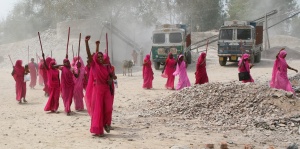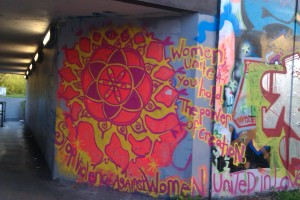This new documentary about the Gulabi Gang, a group of women activists in Northern India is being screened in Bristol in November.
GULABI GANG
Saturday 8th November, Silai Centre, Easton Road, Doors open from 6pm, film starts at 7pm
Suggested donation £3
Nishtha Jain, a film maker from India will be visiting Bristol on 8th November for a very special screening of her latest film, Gulabi Gang, a documentary about an inspirational group of women working in Northern India to challenge gender violence and state corruption.
Please join us for this exciting screening and unique opportunity to learn about the activism against gender violence happening in India at the moment.
*GULABI GANG*
Norway/India/Denmark/2012/Hindi with English Subtitles
A film by Nishtha Jain(India), produced by Oscar and Emmy nominated
Torstein Grude(Norway) and Signe Sorenson(Denmark)
*Synopsis*
Enter the badlands of Bundelkhand in central India and you have entered a
place of desolation, dust and despair. This film follows the Gulabi Gang,
an unusual group of rural women led by the energetic and charismatic Sampat
Pal. They travel long distances to fight for the rights of women and
Dalits. Often they encounter resistance, apathy and corruption, even
ridicule. Sometimes whole villages connive against them to protect the
perpetrators of violence. While we see Gulabi Gang members struggling
against gender violence and state corruption, we also see the flip side –
members getting sucked by the trappings of their new found power. Breaking
away from the deep-rooted patriarchal structure is a challenge even for the
most fearless amongst them. The film pulls us into the centre of these
blazing conflicts and uncovers a complex story about the nature of power
itself.
*AWARDS AND HONORS*
Best Documentary, Dubai International Film Festival, 2012
Best Documentary, Kortfilmfestivalen, Norway 2012
Amnesty International Award for Human Rights, Planete-doc Review, Warsaw
First Amnesty International Human Rights Award, Tri-Continental IFF, South
Africa 2013
Best Documentary, International Association of Women in Radio &
Television(IAWRT) 2013
Best Director, Mumbai International Film Festival, Mumbai, 2014
Best Documentary(Social Issues), National Awards, India, 2014
Best Non-feature Editing, National Awards, India, 2014
Best Protagonist, ImagineIndia, Madrid 2014 & many more!
*Nishtha Jain* is an award winning filmmaker based in Mumbai. She has directed several films including the critically acclaimed
*City of Photos(2005)* and *Lakshmi and Me(2008). *She’s a graduate of
FTII, Pune and Jamia Mass communication Research Centre.
http://www.raintreefilms.net
http://www.lakshmiandme.com


